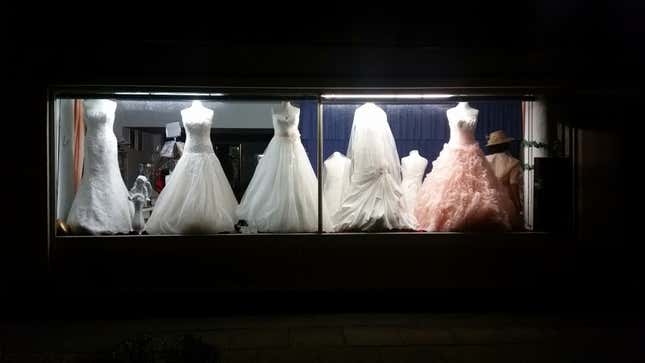David’s Bridal Went Bankrupt Because It Didn’t Speak to the Skeptical Bride
Browsing through their website, you just see corny smile after corny smile. The company fails to capture the growing agnosticism of today’s brides.
BeautyStyle

Last week, wedding dress retailer David’s Bridal filed for bankruptcy—its second time doing so in five years—and reportedly plans to lay off almost 90% of its workforce (about 9,000 employees). Cue a lot of excellent pun-work about cold feet and saying, “I don’t.”
Outlets and analysts have been scratching their heads trying to figure out what this means for the wedding/bridal industry. Is it covid’s fault? Social media’s? One podcast I listened to about this, Dave and Dujanovic, jokingly (I think?) fretted over the strength of the very institution of marriage. Is our country soon to be overrun with unmarried whores?!!?
I think we can all benefit from a deep breath. There are many reasons why a bride might not flock to a store that sounds like their uncle runs it. Court documents named three omens that preceded the retailer filing for chapter 11 bankruptcy: internal factors (boring, so let’s put a pin in it), covid (understandable), and “shifts in consumer behaviors [that] have contributed to the elongation of wedding planning cycles and an overall casualization in wedding events” (let’s fucking dig into this, baby!!!!). CEO James Marcum wrote in the filing that “an increasing number of brides are opting for less traditional wedding attire, including thrift wedding dresses.” Marcum is basically saying, “Brides are trash raccoons these days who want dumpster diving weddings.” I’m kidding, sort of.
Marcum can shade thrift stores and backyard weddings as much as he wants, but I think the company holds the blame for not taking the temperature of the modern bride, who might be skeptical or nervous about the long shadow cast by wedding expectations—not the other way around, as he seems to suggest. Maybe, too, brides who thrift their dresses are simply not devoting every minute to wedding planning, because it’s taken a less central role in their lives.
-

-

-

-

-

-

-

-

-

-

-

-

-

-

-

-

-

-

-

-

-

-

-

-

-

-

-

-

-

-

-

-

-

-

-

-

-

-

-

-








































